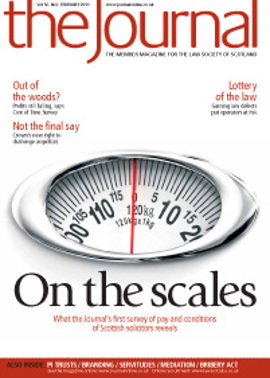Scottish Solicitors' Discipline Tribunal
Appeal under s 42A: John Henderson & Sons
An appeal was made by John Henderson & Sons, Dumfries (“the appellants”) against a finding of inadequate professional service by the Council of the Law Society of Scotland.
The Tribunal found that the service provided to the lay complainer by the appellants in respect of issues 1 and 6 did not amount to an inadequate professional service. The Tribunal therefore quashed the finding of inadequate professional service in relation to those issues. The Tribunal also found that the service provided to the lay complainer in respect of issue 7 did amount to an inadequate professional service.
The Tribunal confirmed the determination and direction of the Society in respect of issue 7, varied the determination in respect of payment of compensation and directed that the appellants pay the lay complainer compensation in the sum of £250. The Tribunal made no alteration to the direction regarding the abatement of fees and made no finding of expenses due to or by any party.
Issue 1 related to a draft statement of claim. The Tribunal considered that many of the errors were very minor and that the lay complainer would not have understood the position regarding the calculation of completed years’ service and would have seen that as an error when, in fact, it was a correct statement.
In the circumstances, the Tribunal was of the view that the issuing of the documentation, which was referred to as a draft and sent for the client’s approval, did not amount in itself to an inadequate professional service just because that documentation contained a number of errors.
In relation to issue 6, the Tribunal was of the opinion that there was so much confusion as to whether the lay complainer’s requests were repeated requests for the same information or a number of requests for different information that this could not amount to an inadequate professional service.
In connection with issue 7, the Tribunal was of the view that if an initial fee estimate becomes substantially increased after a short period, it falls to a solicitor to give reasons for the increase. Therefore the Tribunal considered that additional information should have been given by the solicitors as to why their initial estimate given in December 2007 had increased significantly by February 2008.
The Tribunal considered that in these circumstances the failure to provide more detailed information amounted to inadequate professional service. The Tribunal was of the view that the figure of 20% fixed by the Society had been a fairly modest abatement in relation to the four heads of complaint upheld by the committee. Although only two heads of complaint remained, the Tribunal considered that these were the main aspects of the complaint and therefore the level of abatement of fees should not be altered. In relation to compensation, the Tribunal noted that there were no averments of quantifiable loss. However, the Tribunal considered that an award of compensation should be made in respect of inconvenience and distress.
In this case the award of compensation would relate to both issue 5 (which was not appealed) and issue 7 and the Tribunal considered that cumulatively it fell at the upper end of the second bracket of the Society’s compensation tariff and therefore that a compensation award of £250 rather than £500 would be appropriate in all the circumstances.
Alasdair David Mackie
A complaint was made by the Council of the Law Society of Scotland against Alasdair David Mackie, of Mailers Solicitors, Stirling (“the respondent”).
The Tribunal found the respondent guilty of professional misconduct in respect of his breach of the common law principle relating to conflict of interest and his breach of rule 3 of the Solicitors (Scotland) Practice Rules 1986.
The Tribunal censured the respondent and fined him in the sum of £2,000.
The Tribunal was of the view that the respondent’s actings involved a clear conflict of interest and breach of the 1986 Practice Rules. The Tribunal considered that the respondent’s behaviour by acting for the tenants in a commercial leasing transaction when he was aware that a partner in his firm was acting for the landlords amounted to a serious and reprehensible departure from the standards expected from a competent and reputable solicitor. The Tribunal therefore considered that the respondent’s conduct amounted to professional misconduct.
The Tribunal took into account that this matter involved a single failure in relation to one transaction and was of the view that the misconduct was at the lower end of the scale of professional misconduct.
The Tribunal was of the view that, as the respondent is a partner in a successful firm and his failure was commercially motivated, a censure and a fine was an appropriate sanction.
In this issue
- Mutuality in action
- Tough choices
- Show us the files
- RoS launch business eZine
- Rewards of the job
- Pressure points
- Measure for measure
- Rage against the machine?
- Second bite at the cherry
- Personal injury trusts: benefits and PITfalls
- Countdown for Legal Aid Online
- Training: SYLA will play its part
- Law reform update
- Branding or bragging?
- The learning curve
- Ask Ash
- Mediating retirement
- CICA - a question of timing
- The evidence against
- Fought all the way
- Family friendly
- Stakes too high
- Much ado about plenty
- Limits of authority
- Scottish Solicitors' Discipline Tribunal
- Website review
- Book reviews
- Straight dealing
- Servitudes, developers and flexible rights






